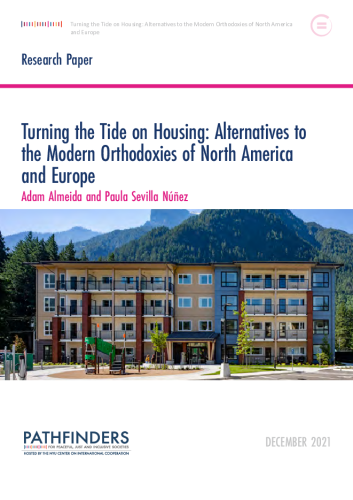This research paper analyzes six case studies across North America and Europe (Berlin, New York City, Seattle, Portland, Minneapolis, Barcelona, Lisbon, and Vancouver) where the orthodoxies of modern housing policy are being challenged. It also addresses the exclusionary practices and spatial inequality that have become common fixtures across the Global North. These fall under three distinct categories: protecting renters, building coalitions and new narratives, and curbing harmful demand.

None of the cases explored offer a silver bullet for solving the housing crisis, and some point to further challenges and unsolved dilemmas in the housing agenda. Decision making around housing policy will need to grapple with the fact that housing in the twenty-first century is conceptualized by both investors and the general public as a valuable financial asset, and is increasingly used as a deposit by global financial actors to grow capital. It will also have to find ways to address wealth disparities between existing homeowners and other citizens. It will further need to bring housing into the broader picture, emphasizing that as long as incomes continue to rise at a slower pace than housing prices, there will always be a housing affordability crisis. Nevertheless, opportunities have arisen to transform current housing policy from a multiplier of inequality and exclusion into a catalyst for equality and inclusion.
Key lessons learned include:
- Housing inequalities are the result of political choices designed to benefit some while excluding others. If the housing crisis is engineered, however, it follows that it is not inevitable.
- Housing policy must make room for housing options beyond homeownership, including through renter protections and support to nonhomeowners.
- Housing reform requires sustained grassroots mobilization—which might take years to bear fruit—but can ultimately result in drastic changes for the people it seeks to empower.
- Successful housing justice movements bring together different agendas toward a common goal, from environmental groups to activists calling for racial justice, as well as young people and migrants.
- Solidarity is a powerful mobilizer: it humanizes rather than stigmatizes those unable to afford a home, and leaves room for understanding the concerns of those opposed to reforms.
Read the full research paper: Turning the Tide on Housing: Alternatives to the Modern Orthodoxies of North America and Europe
This research paper is part of the Pathfinders Grand Challenge on Inequality & Exclusion. More information about this initiative can be found here.


